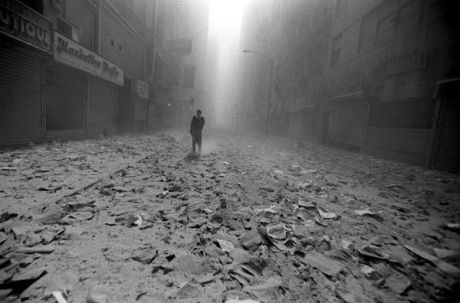Fifteen Years Since 9/11
11 September 2016
Sunday

It is now fifteen years since the coordinated terror attacks of 11 September 2001 on the US — specifically, on New York City and Washington, DC — and while the wars in Afghanistan and Iraq that were the immediate consequence of these attacks are now receding into history like 9/11 itself, we continue to live with the legacy of the altered geopolitical conditions of that day.
The ongoing turmoil in Syria, which began as an uprising against Assad and developed into a civil war, is one of the geopolitical consequences of 9/11. It is unlikely that the uprising against Assad would have occurred without the Arab Spring, and it is unlikely the Arab Spring would have occurred if the US had not toppled Saddam Hussein from power. I am not suggesting a direct chain of causality here — many other events were implicated as well — but only that one set of events is the background to another set of events, and 9/11 was the pivotal geopolitical event of the beginning of the 21st century. As such, the post-Cold War order grows out of the series of events set in motion by 9/11 (counting the last decade of the 20th century as a “buffer” between the Cold War and the War on Terror).
The sluggish recovery of growth following the subprime mortgage crisis and the Great Recession is probably a function of the ongoing geopolitical turmoil, and in this way we can also see that the populist reaction against globalization is also an indirect consequence of 9/11. When the “wealth effect” is contributing to a perception of a rising tide that raises all boats, there is little resentment against those at the top of the income pyramid, but when times are tough the wealth effect dissipates into thin air, and in the clarity of this thin air those who have not done well for themselves cast envious eyes on those who are living well despite tough times.
It would not be difficult to construct a counterfactual world in which 9/11 never happened, “irrational exuberance” continued apace (Keynes called this “animal spirits”), and the world was several percentage points per year wealthier than we are now from steadily growing global trade. We might compare ourselves to this world — not unlike the world of the late 19th and early 20th century, before the spell was broken by the First World War — as a kind of ongoing measure of what might have been.
Bertrand Russell wrote that no one could understand the assumptions of progress of the late Victorian, and then the Edwardian period, and how World War I ended all this, who was not there to experience it. But we have our own analogy, imperfect as it is. We remember the talk of what the post-Cold War world would be like, and how this dream evaporated with the attacks of 9/11. In one day, a world bright with promise for the 21st century simply vanished.
. . . . .
. . . . .
. . . . .
. . . . .
. . . . .





